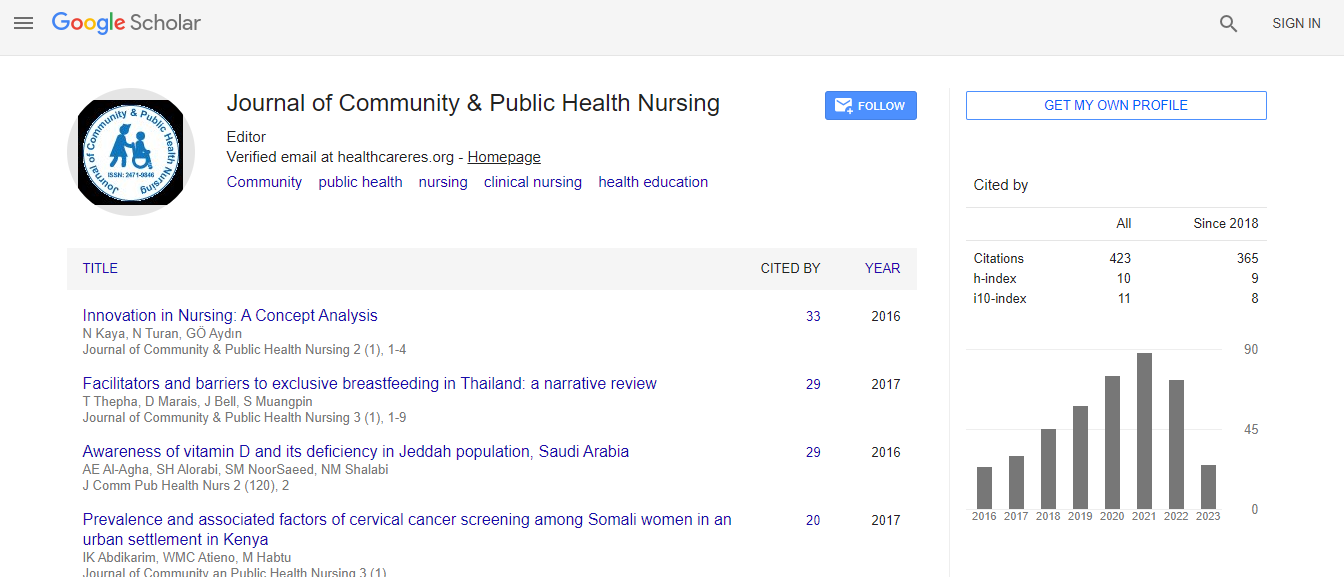Our Group organises 3000+ Global Conferenceseries Events every year across USA, Europe & Asia with support from 1000 more scientific Societies and Publishes 700+ Open Access Journals which contains over 50000 eminent personalities, reputed scientists as editorial board members.
Open Access Journals gaining more Readers and Citations
700 Journals and 15,000,000 Readers Each Journal is getting 25,000+ Readers
Google Scholar citation report
Citations : 739
Journal of Community & Public Health Nursing received 739 citations as per Google Scholar report
Journal of Community & Public Health Nursing peer review process verified at publons
Indexed In
- Google Scholar
- CiteFactor
- RefSeek
- Hamdard University
- EBSCO A-Z
- OCLC- WorldCat
- Publons
- Geneva Foundation for Medical Education and Research
- ICMJE
Useful Links
Recommended Journals
Related Subjects
Share This Page
Preliminary analysis of self-efficacy, self-compassion, & compassion for others
Joint Event on 21st World Congress on Registered Nurse and Nurse Practitioner Meeting & Nursing Education and Management
Dale Hilty
Mount Carmel Collage of Nursing, USA
Posters & Accepted Abstracts: J Comm Pub Health Nursing
Abstract
Researchers have used self-efficacy to investigate online learning, physical therapist, diabetes type 2, work engagement, teacher education, exercise behavior, chemotherapy treatment, Alzheimer disease, counseling, clinical reasoning, and online shopping (Bradley et al., 2017; Costello et al., 2017; Lalnuntluangi, et al., 2017; Lee, 2017; Lisbona et al., 2018; Malinauskas et al., 2018; Middelkamp et al., 2017; Papadopoulou et al. 2016; Salamizadeh, et al., 2017; Ümmet, 2017; Venskus & Craig, 2017; & Yahong et al., 2018). Instrumentation used were self-efficacy (Schwarzer & Jerusalem, 1995), compassion scale (Pommier, 2011), self-compassion scale (Neff, 2003). Pommier's (2011) scale measures compassion toward others. Subscale are: kindness, judgment, common humanity, isolation, mindfulness, and disengagement. Neff's (2003) scale measures compassion toward self. Subscale are: selfkindness, self-judgment, common humanity, isolation, mindfulness, and over-identified. Participants (N=69) in this educational intervention were BSN junior students. The self-efficacy scale was used to create two groups (e.g., high self-efficacy scores, moderate-low self-efficacy scores). Hypothesis 1: Kindness, common humanity, and mindfulness subscales from Pommier's compassion towards others questionnaire would have different mean scores for the two self-efficacy groups. Hypothesis 2: The common humanity, mindfulness, and over-identified subscales from Neff's compassion towards self questionnaire would have different mean scores for the two self-efficacy groups. Independent t-test analyses (SPSS #25) were significant for Pommier subscales (kindness, p=.007; common humanity, p=.001; mindfulness, p=.001) and for Neff's subscales (common humanity, p=.045; mindfulness, p=.001; over-identified, p=.019). Barring over-identified significant finding, BSN students with high scores on SE had high mean scores on the remaining five subscales.Biography
Dale M. Hilty, Associate Professor at the Mt. Carmel College of Nursing. He received his PhD in counseling psychology from the Department of Psychology at The Ohio State University. He has published studies in the areas of psychology, sociology, and religion. Between April 2017 and April 2018, his ten research teams published 55 posters at local, state, regional, national, and international nursing conferences. His colleague sharing the author line of this poster is: Rosanna Bumgardner, EDD, RN.
E-mail: dhilty@mccn.edu

 Spanish
Spanish  Chinese
Chinese  Russian
Russian  German
German  French
French  Japanese
Japanese  Portuguese
Portuguese  Hindi
Hindi 
